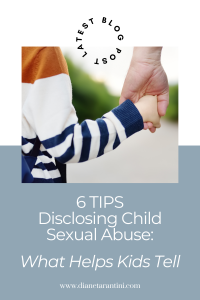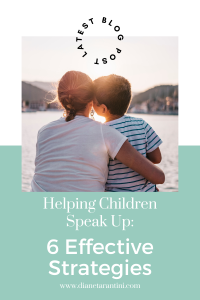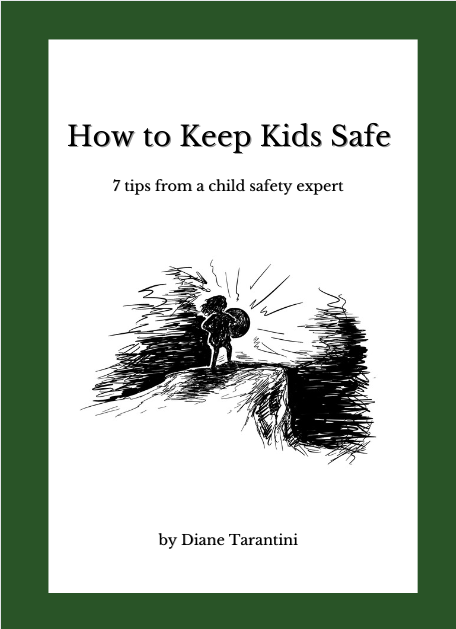When I found six evidence-based recommendations on the topic of “What helps children tell,” a blog post was born! As a survivor of child sexual abuse and a body safety educator in public schools, I’ve got some things to say about each of these suggestions listed on the website of the fantastic child safety organization, Darkness to Light.
As I mentioned in this post, the average age for disclosure of child sexual abuse is 52 years old. Gosh, that’s a long time to heave this kind of hurt around, don’t you think? How can we help individuals disclose sooner, so they can enjoy a better quality of life?
Since I love suspense, let’s start at the bottom of the list.
#6 Being asked helps children tell.
Ask your child about their life, and their body, on a regular basis.
This is “low hanging fruit,” as they say. Simply ask your child once a week, or once a day, if anyone has touched them inappropriately. Or showed them something that frightened them or made them uncomfortable. Or suggested they engage in a not-okay activity. From time to time, remind them of the Bathing Suit Rule.
#5 Assure your child they can tell you anything.
Make sure your child knows they can tell you anything, and you’ll believe them.
As I wrote in this post, fear of not being believed is a deterrent to disclosure for many kids. I know it was for me.
#4 Let your child know you’ll protect them.
If your child is being bullied, sexually harrassed, or abused, they want their antagonizer stopped. They may also want their tormenter to experience consequences.
I know I did. Twice I told my parents what was going on. Twice they did nothing. I probably could have been more clear; however, they gave me no indication they needed more information. Honestly,
My parents’ lack of action led me to question my worth in their eyes.
I wasn’t sure if they feared my abuser—a family member—or if they loved him more than me.
#3 Be on the lookout for emotional distress.
Emotional distress can look like:
- Depression
- Anxiety
- Suicidal ideation
- Rebelliousness
- Withdrawal
- Self-harm
In my case, it looked like anger. Fury, actually. If you looked at me cross-eyed, I might punch you.
Years later, I learned that anger holds hands with grief. I was mourning the “normal” childhood I did not get. For me, anger was safer to express than deep sadness.
#2 Teach your child right from wrong.
On a regular basis, discuss with the kids you love what is appropriate (and inappropriate) behavior with regards to their body.
This is why body safety assemblies—and the “Birds and Bees talk”—are so important. If you don’t tell your children right from wrong, someone else will: peers or pornography. Or possibly, a sexual predator.
#1 Help your child make a list of safe adults.
Over and over, in every child safety talk I attend, I hear this advice. Why? Because for better or worse, kids don’t always feel comfortable telling their parents or school staff when something concerning is happening to them.
That’s why:
- During body safety assemblies, I always suggest to students they make a list of safe adults. And add the contact info for those people to their cellphone.
- I included the activity in the resource section of my children’s book, The Brave Knight.
- I blogged about it here.
These ideas are all super solid ways you can help your children tell you or another safe adult when something is wrong in their life.
So friend,
Which one of these actions will you tackle first–to help your children tell?
Got teens? Equip your kids with the “Ultimate Teen Resource.” This resource helps teens and tweens deal with sextortion, requests for inappropriate photos, and ANY situation that makes them nervous. To receive “The Ultimate Teen Resource,” send me an email here.












2 thoughts on “Disclosing Child Sexual Abuse: What helps children tell”
Excellent advice. I would also add that it’s important for adults to remember that many times because the abuser is someone the victim may have loved , looked up to , or originally felt safe with, they are less likely to tell. Initially many abusers will give extra attention , gifts or provide emotional support. It isn’t always the uncle or cousin who sneaks into the bedroom and starts fondling their victim.
To keep in mind that the abuser develops a special relationship with the victim , one the victim comes to depend upon, makes it less likely for them to tell someone.
Fear of getting their abuser in trouble can hold victims back from telling. Especially true when the abuser is loved by everyone.
And seen as a wonderful person. The child knows this . This is Trauma bonding.
So telling a child that good people sometimes do bad things gives them the opening to say something about the beloved Uncle and confidence they will believed.
Keep up the good work!
These are great ideas, Sandy! Thanks so much for stopping by! I can’t wait to read your book: “Let Me Prey Upon You.”